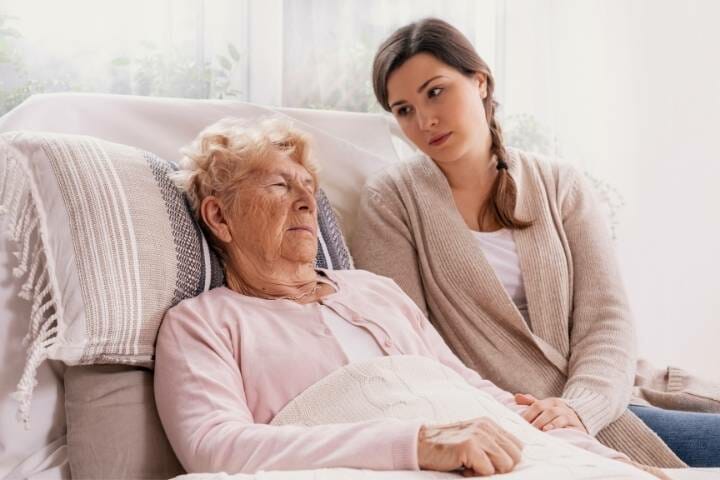When a grandparent gets sick and is dying, many parents struggle with whether their children should visit their grandparents.

Many dying adults will choose against dying at home in an effort to protect their families from seeing them go through their final days, but that doesn’t mean it’s the right thing to do.
Many children will benefit greatly from witnessing the death of a grandparent, and even feel better once they know what’s happening.
Parents will often want to shield their children from seeing a grandparent die because they believe it will be too traumatic for them, and they aren’t ready to witness it.
In most cases, though, this is not the actual reason why they don’t want them to see it. Many people don’t know how to talk about death or the emotions it brings, and so they just try to avoid talking about it altogether.
While medical teams can talk to families about the biological parts of what’s about to happen, many are untrained in how to talk to families about grieving and the emotional parts that come with someone you love dying.
You might like to read: National Senior Citizens Day – Honoring Our Elderly
Contents
History of Dying Grandparents
The idea that parents are concerned about their children experiencing or witnessing death is a relatively recent phenomenon.
Historically speaking, many people would die at home while surrounded by their closest family members – even children.
In many cultures around the world this is still a very common practice, even today.
For centuries children would be included in the dying process of their loved ones because it was part of bringing a family together to experience their loved one’s final days.
Unintended Consequences
While parents want to protect their children from witnessing the harder parts of someone dying, like when someone is in pain, not allowing them to be there while their grandparent is actively dying can have some unintended consequences.

When children are deprived of those final days and final memories with someone they love they miss out on the opportunity to say goodbye.
Saying goodbye can give a lot of closure and they will understand what happened more than just seeing their grandparent sick one day and never coming back.
There has been some research showing that children, like adults, benefit a lot from the closure that saying goodbye can give to them. Children will sometimes imagine a scenario so much worse than what is actually happening, so witnessing death can actually put their mind at ease.
How Much Time Should My Child Spend With a Dying Grandparent?
There isn’t a clear cut answer to this question, as it will really depend on the age of the child and their personality.
Some children will only need a short amount of time with their grandparent, say their goodbye and they are ok with what’s happening.
Other children will want to spend more time, talking to their grandparent (even if they are unconscious) and asking questions to their parents.
You may need to assess the situation as it happens, and not have a cut off time in mind. See how your child reacts to it and go with what they are comfortable with.
It’s very important that you make sure your child knows they are in a safe environment and they are free to ask questions if they’d like to.
You will likely want to prepare your child, even a little bit, for what is likely to come with visiting a dying grandparent. Here are a few guidelines for preparing them and making sure they are ok.
You might like to read: How To Choose The Right Care Option For The Elderly?
Preparing Your Child for the Death of a Loved One
One of the best things you can do for children who will be visiting a dying grandparent is to prepare them for what they might see, and helping them to understand what’s going on.
Some children will have a lot of questions, while others will just stay quiet and listen to what you have to say only asking questions as they come to mind.
Try to give them as much information as they ask for, and don’t overload them with it.
There will be some basics you’ll need to go over with them, of course, before they go to visit.
Rules for Visiting
If the room or area the grandparent is in needs to be quiet then you need to prepare your child for this ahead of time.
Although if the grandparent is dying at home or in a private area in a hospital or long-term care home then the family may have a little more flexibility with discussions.
There may also be machines in the room that help with pain management or dispense medications to your loved one. If that’s the case, you’ll need to instruct your child on being careful to not touch anything or push any buttons in the room.
Lack of Alertness
When anyone dies, it’s a very exhausting process and so they will often be very sleepy or seem like they are not very alert.

Their grandparent may be sleeping a lot of won’t wake up when they come to visit.
It’s important to let your child know, though, that even if their grandparent doesn’t wake up or seem like they are awake they may still be able to hear you – even if they don’t respond. So if they want to talk to them or say goodbye, their grandparent may still know they’re there and understand them.
Eating and Drinking
When people get close to dying, they tend to not eat or drink anything because a dying body stops needing those things.
In a child’s mind, their loved one is dying because they are not eating or drinking anything so they may encourage them to eat something or try to get them to eat something while they’re visiting.
It’s important to explain to your child that even if their grandparent were to eat or drink something it would not help to keep them alive any longer or help get them healthy again.
Pain Management
Many patients will receive pain medication towards the end of their life, just to keep them comfortable during their final days or moments.
For children, they associate medication with something people take to get better. This simple association, in their minds, may lead them to believe that the medication their grandparent is getting is going to make them better.
If your loved one is in a lot of pain, you may want to make sure young children do not visit until the pain is well managed as they may not be able to understand what is going on and be upset by seeing someone they love in that much pain.
Confusion
As part of the dying process, many people become very confused or disoriented when they are close to dying.
They might not know where they are, they might called family members by the wrong name or not even know who some family members are.
For children who are old enough to know who their grandparents are, it can be very upsetting for their grandparent to not recognize them or call them by the wrong name.
It’s important to explain to your child, as best as possible, that this isn’t their fault and it has nothing to do with them. This is part of the dying process and their brain is just not working like it used to.
You might like to read: Sandwich Generation-Caring For Young Children And Elderly Parents At The Same Time
Change in Skin Color
Sometimes a person’s skin color will change – perhaps because their kidneys or liver are not working like they should.
If this is the case for your loved one, prepare your child ahead of time that they might not look like they used to but it’s still them.
Also, during the final hours of life a person’s limbs can turn blue or become cold to the touch. If this happens, it’s important to prepare your child for what they might see while visiting.
Changes in Breathing
When a person is dying, their breathing can change. Often times, there will be long gaps between each breath or their breathing may seem supressed – which is usually due to the pain medication.
Alternatively, their breathing can sound almost like gurgles – like they are drowning. This can be pretty hard to watch and even upsetting to young children.
This doesn’t cause any harm or pain to the person experiencing it, so it’s important to let children know that it’s not hurting their loved one any.

You might like to read: Life Lessons From The Elderly
Prepare for Questions
Every person – even children – will handle the death of a loved one differently. It’s important that you encourage children to ask questions when they are ready to, and let them know they are in a safe environment.
Show Them How to Interact
Children may not know exactly what to do when they walk into the room. They are used to grandparents who are fun and lively – they don’t know how to handle someone who is laying in a bed like this.
Showing them ways that they can interact with their grandparent can help them to feel a little more comfortable in the room.
If They Don’t Want to Visit
It’s important to remember that children who do not wish to visit a dying grandparent are not forced to. Some people do not handle death and dying very well, so if the child doesn’t feel comfortable it’s very important that you respect that – no matter the age.
You may wish to ask them why they don’t want to, and help to answer any questions or clear up any misconceptions they might have. This conversation may help them to decide if they want to visit their grandparent or not.
No matter what choice your child makes, it’s important to just be there for them and let them know they are in a safe environment where they are loved.
By respecting their decision – whatever it is – they will be better equipped to handle what it happening: losing someone they love.
